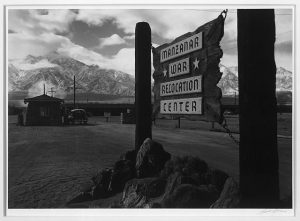Summary
President Franklin Delano Roosevelt signed this war-time executive order authorizing the rounding up and incarceration of Japanese Americans living within 100 miles of the west coast. The Japanese attack on Pearl Harbor on Dec. 7, 1941 resulted in swift action against Japanese Americans, including the freezing of their bank accounts, loss of jobs, and imposition of a curfew. About 120,000 Japanese Americans, two-thirds of whom were U.S.-born citizens, were forced to leave their homes, farms, and businesses.
Several challenges to the detention of Japanese Americans, filed by Fred Korematsu and Gordon Hirabayashi, failed, as the Supreme Court as justified violating their civil right protections under the principle of “military necessity.” Although the Korematsu decision would be vacated during the 1980s because federal prosecutors hid the fact that no evidence had been found of any espionage or treason by Japanese Americans, the Supreme Court let stand the principle of “military necessity” as justification for setting aside civil rights protections.
In contrast, Italian and German Americans suspected of conspiring with enemies of the United States were handled as individuals based on specific evidence of acting as “enemy aliens.”

Source
Executive Order No. 9066
The President
Executive Order
Authorizing the Secretary of War to Prescribe Military Areas
Whereas the successful prosecution of the war requires every possible protection against espionage and against sabotage to national-defense material, national-defense premises, and national-defense utilities . . . .
Now, therefore, by virtue of the authority vested in me as President of the United States, and Commander in Chief of the Army and Navy, I hereby authorize and direct the Secretary of War, and the Military Commanders . . . to prescribe military areas . . . from which any or all persons may be excluded, and with respect to which, the right of any person to enter, remain in, or leave shall be subject to whatever restrictions the Secretary of War or the appropriate Military Commander may impose in his discretion. The Secretary of War is hereby authorized to provide for residents of any such area who are excluded therefrom, such transportation, food, shelter, and other accommodations as may be necessary, in the judgment of the Secretary of War or the said Military Commander, and until other arrangements are made, to accomplish the purpose of this order . . . .
I hereby further authorize and direct the Secretary of War and the said Military Commanders to take such other steps as he or the appropriate Military Commander may deem advisable to enforce compliance with the restrictions applicable to each Military area hereinabove authorized to be designated, including the use of Federal troops and other Federal Agencies, with authority to accept assistance of state and local agencies.
I hereby further authorize and direct all Executive Departments, independent establishments and other Federal Agencies, to assist the Secretary of War or the said Military Commanders in carrying out this Executive Order, including the furnishing of medical aid, hospitalization, food, clothing, transportation, use of land, shelter, and other supplies, equipment, utilities, facilities, and services.
This order shall not be construed as modifying or limiting in any way the authority heretofore granted under Executive Order No. 8972, dated December 12, 1941, nor shall it be construed as limiting or modifying the duty and responsibility of the Federal Bureau of Investigation, with respect to the investigation of alleged acts of sabotage or the duty and responsibility of the Attorney General and the Department of Justice under the Proclamations of December 7 and 8, 1941, prescribing regulations for the conduct and control of alien enemies, except as such duty and responsibility is superseded by the designation of military areas hereunder.
Franklin D. Roosevelt
The White House,
February 19, 1942.

